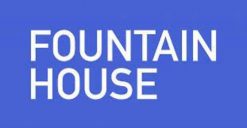
Too many of us are left desperate, struggling, in crisis, and often with nowhere to turn.

We need a better response to mental health crisis in America.
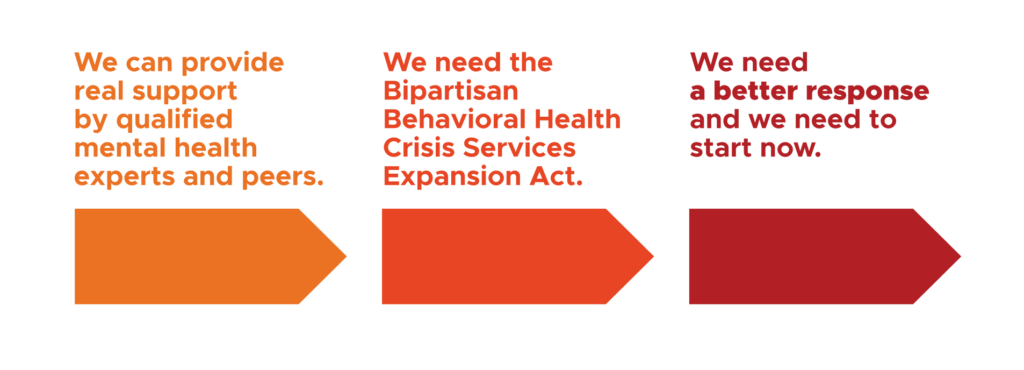
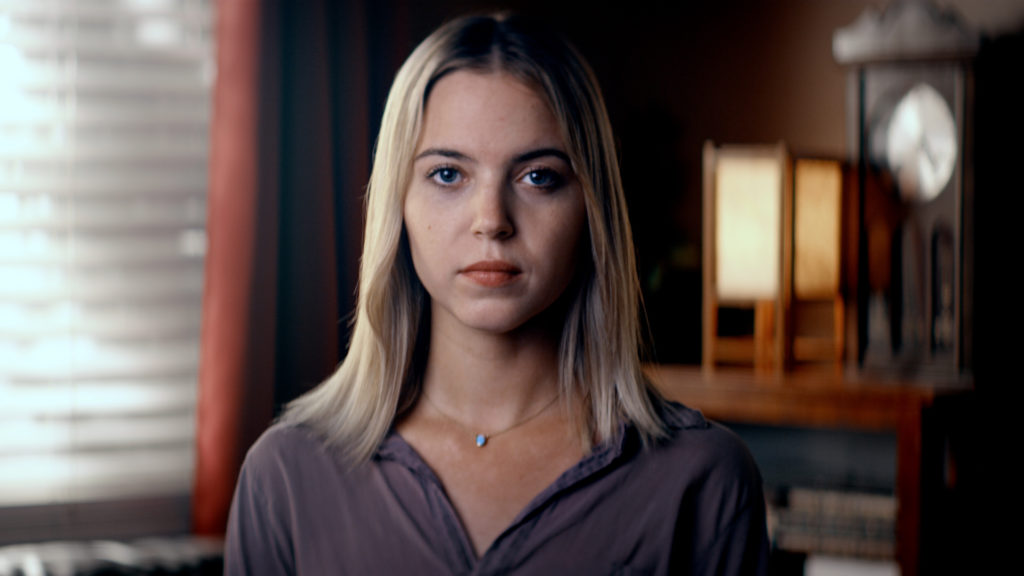
We need a better response to the mental health crisis in America. In communities across the country, our response to people in mental health crisis is uneven and varies greatly depending on where you live.
In Long Beach, California, an innovative partnership between the Veterans Administration and the local sheriff’s department has made all the difference in providing appropriate and compassionate care for veterans experiencing mental health crisis. A nine-year-old girl in crisis in Rochester, NY was handcuffed and pepper-sprayed, layering trauma upon trauma. People in crisis deserve consistent, competent, and compassionate care, no matter their zip code.
A better response means commonsense and compassionate intervention and life-saving treatment.
A better response means a healthier, safer community.
We need a better response to people in crisis.
The needs of first responders continues to increase as violent crime, mental health crisis, and opioid overdose accelerate. Too often, overstretched, and mismatched services result in slow response and more confrontation when what we need is help. Urgently and sometimes desperately.
We envision a world where the need for crisis response is rare, the response if fair, and the help is lifesaving.
We can change this and repair our system so that when someone asks for help, the right person answers the call; the right person shows up.
We can provide real support by qualified mental health experts and peers.
Too often, overstretched, and mismatched services result in more confrontation when what we need is help. Urgently and sometimes desperately.
We can change this and repair our system so that when someone asks for help, the right person answers the call; the right person shows up.
Mental health crisis impacts all walks of life. CDC data shows that suicide is the second leading cause of death for people Americans ages 10-34. There is one death by suicide every 11 minutes. Drug overdose deaths exceeded 100,000 for the first time and the percentage of youth visits to emergency departments for mental health crises increased by at least 24% in the past year.
When someone is in crisis, we must act fast and we must act compassionately and effectively.
The demand for a better response continues to increase as mental health, substance use and suicidal crises accelerate. Without appropriate crisis services, the result is too often confrontation when what we need is help. Urgently and sometimes desperately.
We envision a world where the need for crisis response is rare, the response is fair, and the help is lifesaving. We can change this and repair our system so that when someone asks for help, the right person answers the call; the right person shows up.
We can provide real support by qualified mental health experts and peers.
What is a better response?
We need to transform crisis response in America and we need to start now. Congress designated ‘988’ as a three-digit number for suicide prevention and mental health crisis hotline, available nationwide since July 2022. But people need more than a number when they are in crisis—they need the right response in the right place, every time. We need legislation to change the way we help people when they need it most.
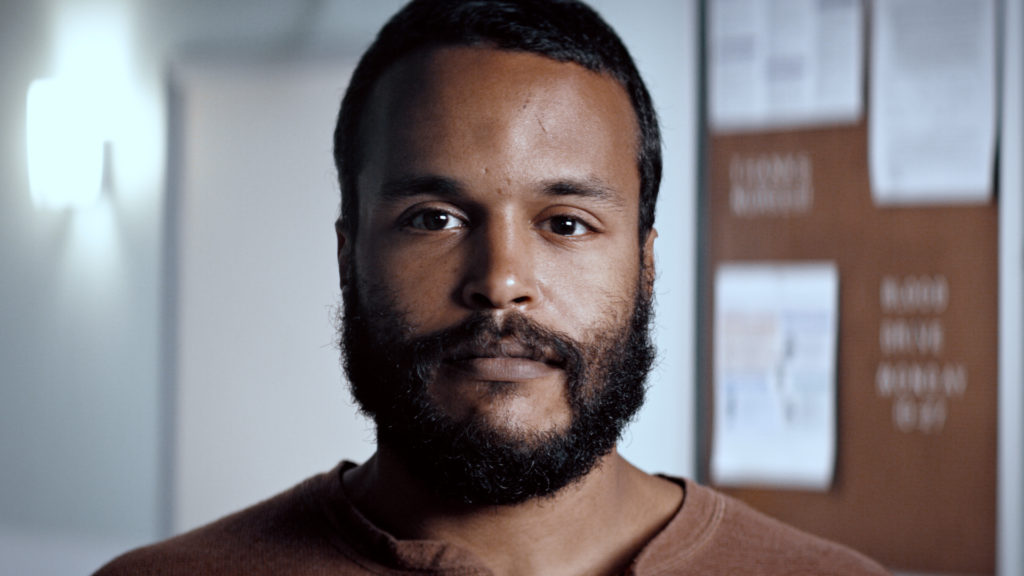
Let's Advocate For:
Direct the Department of Health and Human Services (HHS) to establish national standards for behavioral health crisis care, including:
- 24/7 crisis call centers,
- Mobile crisis teams,
- Behavioral health urgent care facilities, and
- Short-term crisis stabilization and crisis residential options.
This means Medicare, Medicaid, Affordable Care Act health plans, employer-sponsored coverage, the Federal Employee Health Benefits Program, and by the VA and TRICARE.
This grant program would include technical guidance provided by HHS and a database for communities to share successful ideas and services.
When symptoms escalate, law enforcement are often the first responders for people experiencing mental health crises. No one wins in this system and, too often, this leads to trauma and tragedy—unnecessary arrests and incarceration, stressful emergency department visits, and avoidable deaths.
These crisis interventions have already been proven to work in Texas and other states around the country. Starting in 2018, Dallas launched the Rapid Integrated Group Healthcare Team (RIGHT Care) program, which provides comprehensive emergency response to calls involving mental health emergencies. This system allows for specially trained and equipped paramedics, mental health professionals and police officers to respond as a single coordinated team. In just an 18-month period, RIGHT Care teams responded to four thousand calls in south-central Dallas, resulting in fewer than 2% arrests and diverting ~900 people from emergency departments and ~500 people from jail. In New Mexico, social workers and behavioral health staff patrol Albuquerque and field calls related to mental health, substance abuse or homelessness that otherwise would have been handled by a law enforcement officer.
How can you help?
We need everyone to join us in calling for A Better Response. Inseparable, Fountain House, and allied organizations are driving an advocacy and education campaign to pass best practices for crisis response.
We’re digging in to change how we define and respond to crises.
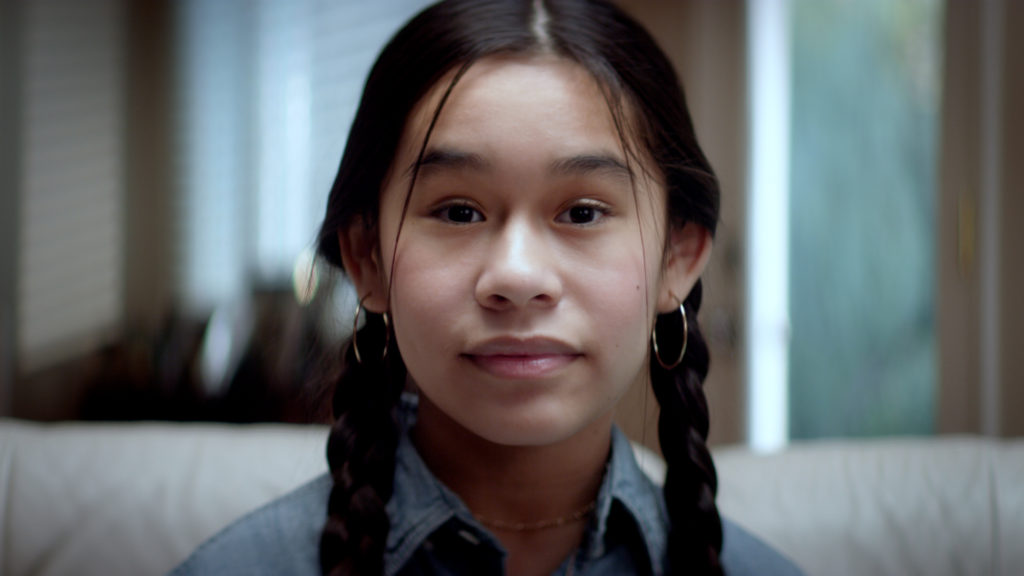
There are a multitude of organizations in support of these policies, including:
- 2020 Mom
- American Art Therapy Association
- American Association for Psychoanalysis in Clinical Social Work
- American Association of Suicidology
- American Association on Health and Disability
- American Counseling Association
- American Foundation for Suicide Prevention
- American Mental Health Counselors Association
- American Psychiatric Nurses Association
- American Psychological Association
- Anxiety and Depression Association of America
- Association for Ambulatory Behavioral Healthcare
- Center for Law and Social Policy (CLASP)
- Centerstone
- Children and Adults with Attention-Deficit/Hyperactivity Disorder (CHADD)
- Clinical Social Work Association
- College of Psychiatric and Neurologic Pharmacists (CPNP)
- Depression and Bipolar Support Alliance
- Eating Disorders Coalition
- Education Development Center
- Fountain House
- Girls Inc.
- Global Alliance for Behavioral Health and Social Justice
- Inseparable
- International Society for Psychiatric Nurses
- (The) Jed Foundation
- (The) Kennedy Forum
- Lakeshore Foundation
- Maternal Mental Health Leadership Alliance
- 9Mental Health America
- National Alliance on Mental Illness (NAMI)
- National Association for Behavioral Healthcare
- National Association for Children’s Behavioral Health (NACBH)
- National Association of Peer Supporters, National Association of Social Workers
- National Association of State Mental Health Program Directors
- National Board for Certified Counselors (NBCC)
- National Coalition for Shared Safety
- National Federation of Families for Children’s Mental Health
- National Register of Health Service Psychologists
- (The) National Shattering Silence Coalition
- RI International, Inc.
- SMART Recovery
- The National Alliance to Advance Adolescent Health
- The Trevor Project
- Well Being Trust
- Wounded Warrior Project
A Better Response In The News
“Texans have the lowest access to mental health professionals — but there is a path forward.”
Andy Keller and Bill Smith, The Dallas Morning News
“When will we have a better response to the mental health crisis?”
Anne Scott, Las Vegas Sun
“In New Mexico, a bold experiment aims to take police out of the equation for mental health calls.”
Griff Witte, Washington Post

